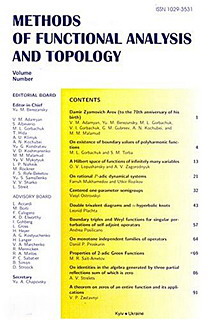Abstract
We introduce the renormalized powers of $q$-deformed white noise, for any $q$ in the open interval $(-1,1)$, and we extend to them the no-go theorem recently proved by Accardi-Boukas-Franz in the Boson case. The surprising fact is that the lower bound ( ef{basicineq}), which defines the obstruction to the positivity of the sesquilinear form, uniquely determined by the renormalized commutation relations, is independent of $q$ in the half-open interval $(-1,1]$, thus including the Boson case. The exceptional value $q=-1$, corresponding to the Fermion case, is dealt with in the last section of the paper where we prove that the argument used to prove the no-go theorem for $q \ne 0$ does not extend to this case.
Full Text
Article Information
| Title | Higher powers of q-deformed white noise |
| Source | Methods Funct. Anal. Topology, Vol. 12 (2006), no. 3, 205-219 |
| MathSciNet |
MR2261575 |
| Copyright | The Author(s) 2006 (CC BY-SA) |
Authors Information
Luigi Accardi
Centro Vito Volterra, Universita di Roma TorVergata, Via di TorVergata, 00133 Roma, Italy
Andreas Boukas
Department of Mathematics and Natural Sciences, American College of Greece, Aghia Paraskevi, 15342 Athens, Greece
Citation Example
Luigi Accardi and Andreas Boukas, Higher powers of q-deformed white noise, Methods Funct. Anal. Topology 12
(2006), no. 3, 205-219.
BibTex
@article {MFAT370,
AUTHOR = {Accardi, Luigi and Boukas, Andreas},
TITLE = {Higher powers of q-deformed white noise},
JOURNAL = {Methods Funct. Anal. Topology},
FJOURNAL = {Methods of Functional Analysis and Topology},
VOLUME = {12},
YEAR = {2006},
NUMBER = {3},
PAGES = {205-219},
ISSN = {1029-3531},
MRNUMBER = {MR2261575},
URL = {https://mfat.imath.kiev.ua/article/?id=370},
}

